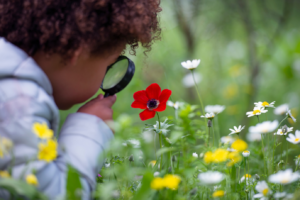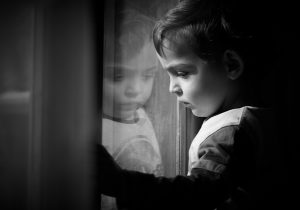The Dangers of Narcissistic Parents
 How narcissistic parents substitute emotional hunger for love.
How narcissistic parents substitute emotional hunger for love.
For me, one of the best examples of narcissistic parents is illustrated in the movie “The Joy Luck Club,” based on the novel by Amy Tan. In the film, a woman flashes back and, through voiceover, tells her story of becoming a child protégée as a chess champion. While the film plays one of her early victories, the woman’s voice says, “Even at that age, I knew I had an amazing gift: this power, this belief in myself… It was the only part of my life, to this day… where I trusted myself completely.”
The next scene flashes to the young girl being paraded around her neighborhood by her mother, who is carrying a Life Magazine with her daughter on the cover. She greets each person on the street, showing them the cover and introducing her child as a “chess champion” – all the while taking personal credit for her daughter’s gift. Humiliated by her mother’s narcissistic behavior, the little girl declares, “Why do you have to use me to show off? If you want to show off…then why don’t you learn to play chess?”
Most of us can relate, on some level, to scenes such as these – to ways our parents over-connected or lived through us, as a reflection of them. But when dealing with a narcissistic parent day in and day out throughout one’s childhood, the impact can be devastating. For example, in “The Joy Luck Club,” the little girl quits playing chess in retaliation to her mother’s intrusiveness. Her mother responds by giving her the silent treatment. After weeks, the young girl makes an effort to regain her mother’s approval and announces that she’s decided to play chess again. Without so much as a glance, her mother coldly replies that it won’t be so easy for her anymore. This cutting remark shatters the girl’s confidence, and, as her mother predicted, she can no longer win. Her voiceover concludes the story with, “This power I had, this belief in myself… I could actually feel it draining away… All the secrets I once saw… I couldn’t see them anymore. All I could see was–were my mistakes, my weaknesses.”
The problem with narcissistic parents is that, although the focus seems to be on the child, there is actually very little regard for the child in their parenting style. When her daughter insulted her own ego, the mother in the film no longer saw use for her the young girl’s talent. She didn’t support her daughter playing chess, because it made her daughter feel good or gave her confidence. She supported it, because it gave her the chance to feel like a winner, to bask in her child’s accomplishments and take credit for skills that were not her own.
The obsession or focus a narcissistic parent has on a child often has to do with the parent’s own emotional needs. Narcissistic parents support children’s “greatness” and encourage their talents, with the excuse that they love their child and are sacrificing themselves for the child’s future. In fact, just the opposite is often true. The so-called support these parents offer is actually a great deal of pressure, while the love they feel they’re giving their kids is, in truth, an emotional hunger that is draining to a child.
In my interview with psychologist Dr. Pat Love for PsychAlive.org, she wisely pointed out that the best thing a parent can do for their child is to have their adult needs met by other adults. When we relate to our children, it’s so important to continually ask ourselves, are we taking actions to meet their needs or are we using the child to meet our own? Is the hug we give them to offer them something or to take something from them? Is their performance in school important to us because we care about their future or because we care about our performance as a parent?
Too often, we use our children to compensate for our own unmet goals or limitations. When we don’t feel fulfilled in our own lives, we can over-identify with our kids. In the name of being “selfless,” we can selfishly lose perspective and focus all our dreams and desires on them.
A narcissistic parent doesn’t just apply this pressure by being strict or demanding. They do it by praising their child, bolstering them up, as they would themselves. In doing so, they may believe they are helping the child to become a competent and confident adult, but sadly, they are often doing just the opposite. When we praise our child for qualities they don’t have or exaggerate their skills, we are actually handicapping the child. We arm them with the burden of being great or “the best.” They often grow up with the fear of disappointing their parent or the pressure to keep their parent happy, as opposed to vice versa. They carry a constant weight on their shoulders that can hold them back from truly reaching their full potential.
The emptiness these children feel can manifest itself in the form of an inner critic or “critical inner voice” that reminds them they are not good enough or that they need to be the best or they are nothing. Because their parents only value their accomplishments as they reflect on them, the child never truly feels they are good enough. They even struggle to develop their own sense of self. A woman I recently met described how her mother would constantly compare her to other little girls around her. “You are much prettier than her,” “She is better than you at this, but you are much better at that,” etc. This led the girl to grow up with an internal rating system. Throughout her life, she found herself constantly ranking herself and others, without even thinking about it. Her mother’s own competitive feelings with her had ultimately led the woman to make these comparisons herself. As an adult, her mother’s voice had been embedded in her mind, leaving her to continue to put herself down or build herself up automatically in every interaction.
Even though it’s almost always unconscious, when we grow up, we tend to repeat patterns or live out our parents’ prescriptions for our lives. We can break this chain as parents by seeing our child as a separate person. We can acknowledge our kids for real traits they have and support what they love to do. For example, instead of saying, “The picture you drew is amazing! You are the best artist,” we could say, “I love all the colors you used in that picture. It really seems like you had so much fun drawing it.” Think about the effect your words, actions, and attitude will have on your child as a person. Do you want them to grow up to work hard for their achievements, or to give up when they realize that they fall short of being the best?
As mindfulness expert, Dr. Donna Rockwell so eloquently expressed in another recent interview for PsychAlive.org, “The best way we can teach [our children] is by being interested in them as people. And instead of saying ‘I need you to be a doctor or a lawyer or a candle maker,’ to discover what do you love about life and what’s interesting to you and what do you want to be… And they are born already gifted, already extraordinary at something, and we ruin that if we try to negotiate how they’re going to grow in life.”
The most we can do as a parent is provide for our children, love them for who they truly are, and help them to develop into their own capable, unique person. We should always aim to care more about our child’s character than how he or she appears. What kind of person are they? Are they kind? Compassionate? Patient? Resilient? When we lead by example, we can help our children to be independent, and therefore, more confident in facing the world. When we do this, we teach our children that it is even okay to fail, that they are strong enough to persevere, push through challenges and improve to become the kind of person they themselves seek to be.
Tags: narcissism, narcissistic parents, parenting








Wow this article is about nice Narcissistic parents. I would love to have a parent like this compared; to the hell I had lived through. What about the Narcissistic parent who physically and sexually abuses her children out of total entertainment value. Literally laughs after her child is in total shock of what the hell just happened.
very good intelligent informative sensitive article
I agree with RaisedbySociopath. This is good info, but it sounds more like a description of a mother with a few narcissistic characteristics, a little more than is healthy, not a full-blown narcissistic mother. In our household, a day when my father’s wife praised my accomplishments to others and compared me to people in unhealthy ways was an unusually good day. A treat. A normal day involved screaming at me and my father, physical violence (to both of us, but more often me), and telling me that I never had to worry about having a rotten, worthless husband like she did because I was so ugly and stupid that I could never marry. In fact, the last conversation we had before I cut off contact was her crowing about how skinny and beautiful she still was at her age, and how strong and brave I must be to go out in public while being so large. We’re both size 4, so this isn’t just mind-bogglingly rude, but also either delusional or deliberate. Narcissists aren’t trying to help their children and sometimes just doing a crappy job at it. It doesn’t occur to them to help anyone other than themselves, and they only do or say nice things to manipulate others or, like her comment on my supposed courage, to be nasty.
I am moving away from my narcisstic mother and cut off all contact with her. I am afraid that things will go horribly wrong on the day of my move. She could follow me to my new place to find out my address, make a big scene in front of my new neighbourhood or turn my extended family against me. She has already turned my brother against me.
All you can do is run!
My sadistic mother enjoys watching me cry and tells mean and cruel stories to feed off my pain.
I see a smile at times. When I told her my husband choked me she laughed and told me it didn’t happen.
The next day she brought him food. She flirts with him and excuses his abuse and infidelity. Yes he’s a Narcissist too. I left him after 20 years of marriage.
Hopefully one day I’ll feel love.
I to was raised by an abusive sociopath, bully who was overly interested in my sexuality. She was also a raging maniac who ruled by fear and intimidation. These almost sound like good parents.
What is the difference between NPD and Aspergers Syndrome?
Growing up I knew both of my parents had emotional problems, I know my mother has NPD, but my father may have Aspergers because he has OCD.
This author sounds like a classic narcissist
I agree that the description sounds more like parents with psychological problems and narcissistic traits. It has helped me put some pieces of the puzzle together but it sounds like pretty average family disfunction to me.
My mom laughs at me in my face when symptoms of panic attacks and anxiety surface, especially when she feels personally attacked or emotionally triggered. She said I was my fathers daughter and “gave’ me to him to be punched on a daily basis while laughing really loud because it was “just playing”. I know he punched her way less when he had me to discharge his stress on. They both said the abuse never happened and got their whole social network to scapegoat and laugh at me as well. My mom told me stories of how children hurt their parents for years and years. She sabotaged wholesome highschool dating for me and my sister. The cruel joke is they never made my sister break up with the twenty something boyfriend that structurally beat me with their knowing at the age of 14. She said the reason why I had to put up with this guys beating was that she was afraid my sister would run away. She “protected” my sister from me and our dad, because according to her our dad always “helped me win” when I was like 2 and she was 4 or something. She would never admit it had nothing to to do with that, it was an opportunity she took to ease her own distress at my cost. She’s convinced she could see I was going to be a fat person because as a baby I had a loose skin. It’s not because of the force feeding and manipulating to eat way more than I could finish as a child, and later on got so many symptoms as a result from the abuse I got terribly sick. For years mom brought me articles of psychological and psychiatric diseases that I must be having.
My dad is convinced he would never cross healthy boundaries and has never hurt me, even when the punching alone can cause TBI as a result of scar tissue on the brain with the thousands of collisions between the soft brain-tissue and the skull.
They sabotaged my parenting relationship with my daughter, then when she started acting out, told me I should beat her and said I was a bad mother in her presence.
In their minds these things and more are all defended with reasonable arguments and there is nothing wrong with them. In their eyes something is wrong with me for having boundaries, characteristics and emotions that upset them emotionally. I their eyes I hurt them and they are good parents. They either don’t remember or totally deny ANYTHING that confronts their behavior or can hold them accountable. The things they do admit to always have a reason for entitlement as a result of other people’s fault / their role as victim instead of their own accountability. Their emotional needs are so big and destructive it almost killed me and somehow I couldn’t get out. The parasite was already inside me. Now I am slowly taking my own space back inside my psyche, by understanding the narcissistic patterns better, healing, re-raising myself, rewiring my brain, living by My Truth. Being a good mother who holds herself accountable in order to grow, learn, heal and move forwards.
It’s a big game of psychological warfare that I’m mastering here, the situation described in the article sounds like a fieldtrip to me.
To all of you who were raised by narcissistic parents: Love yourself more and learn how to be present for yourself with kindness and tenderness. <3 <3
I am blown away by so much of this. While I was raised by a very good mother I never knew who my dad really was personally. He was there but very abusive. My ex on the other had kept me very close. If I spoke incorrectly I was reprimanded. At times my new husband did that but here recently we came to an understanding of where and why our coparneting styles differed. He has a very narassistic ex wife who use to tell him he was not a good father despite his work ethic, despite him coming home and cooking dinner or cleaning the house. She always left him in doubt of being a good man or good enough. Me on the other hand experienced trauma from my first husband after he denied our 2nd son and I found out he was cheating on me. Talk about a low blow and 7 months of utter hell! A few years past when I decided to leave him and reluctantly went back because he called every boss from mid level to high level in my cooperation to ask if they were having sex with me. He would follow me and stalk me continually. Finally after enough courage I asked him for the separation and after a few months he forced himself on me twice even when we didn’t sleep in the same bed. I constantly lived in fear and even to this day I allowed him to keep our daughter when I moved because I didnt want the fight. Over the course of the past 7 years my ex and my husband’s ex have made our lives a living hell. Lies, calling children and you to my husband’s ex lying to her own boys that she gave up to move to Mexico. We are told that we can file charges for harrassment but really who does that hurt in the end. The kids are the most greatly hurt by the abuse and the abusers. The boys want to stay with my husband’s ex because I believe they desire so much their mother’s love. I get that. But man it still hurts terribly
This is off the subject: Just found psychalive. I really like the articles. I have a client with a narcissistic mother; I’m going to share this with her. I there any kind of “on line” chat room or “whatever” for therapists to banter back and forth about what to do about certain clients, symptoms or problems? Or legal or ethical questions for that matter? Thx
My mother was and still is a full blown raging narcissistic. My father took me away from her at the age of 16. My father had narcissistic traits but was the better parent I saw him control his new wives but he never did anything like that with me. I stayed away from her at 16 except occasionally. Then I married a text book narcissistic but he had a good job. My mother loved him. She was so happy I got someone who was so accomplished. I was around her some after that. She wanted to be around me more then. But still I tried to stay away simply because I couldn’t stand to be in the same room with her. My memories had faded and I rarely thought about my childhood. I left my ex after 18 years. When I did she constantly put me down and tried to reach out to him. He tried to kill me by pushing me off of a third story balcony when I was trying to leave him. That was the only time he physically hurt me. I got away thanks to my neighbors coming out and begging him to let me go. I never went back. I told my mother but she was never on my side. She expected me to stay and she still contacted him. I walked away from her then. Still I hadn’t realized that I married her trying to fix my childhood problems simply because most of my life I did my best to stay away. Then she almost died twice and I took her to the ER then I let her in my life again. I realized what she was and started remembering my childhood. I guess it was good for me to understand but I’ve sunk in the worst depression and I’ve gotten books to try to help myself.
This is insightful and well-presented.
for “rejected parents” of deliberately estranged adult “children”:
DO NOT STALK AND/OR HARASS PEOPLE WHO HAVE MADE IT CLEAR THEY ARE UNINTERESTED IN YOUR “LOVE.”
it doesn’t matter whether they’re your ex, your colleague, a celebrity, or someone you share dna with. it doesn’t matter if they’re faaaaaamily. DO NOT STALK AND/OR HARASS PEOPLE WHO HAVE MADE IT CLEAR THEY ARE UNINTERESTED IN YOUR “LOVE.” it is intrusive, obsessive, obviously unbalanced, and illegal.